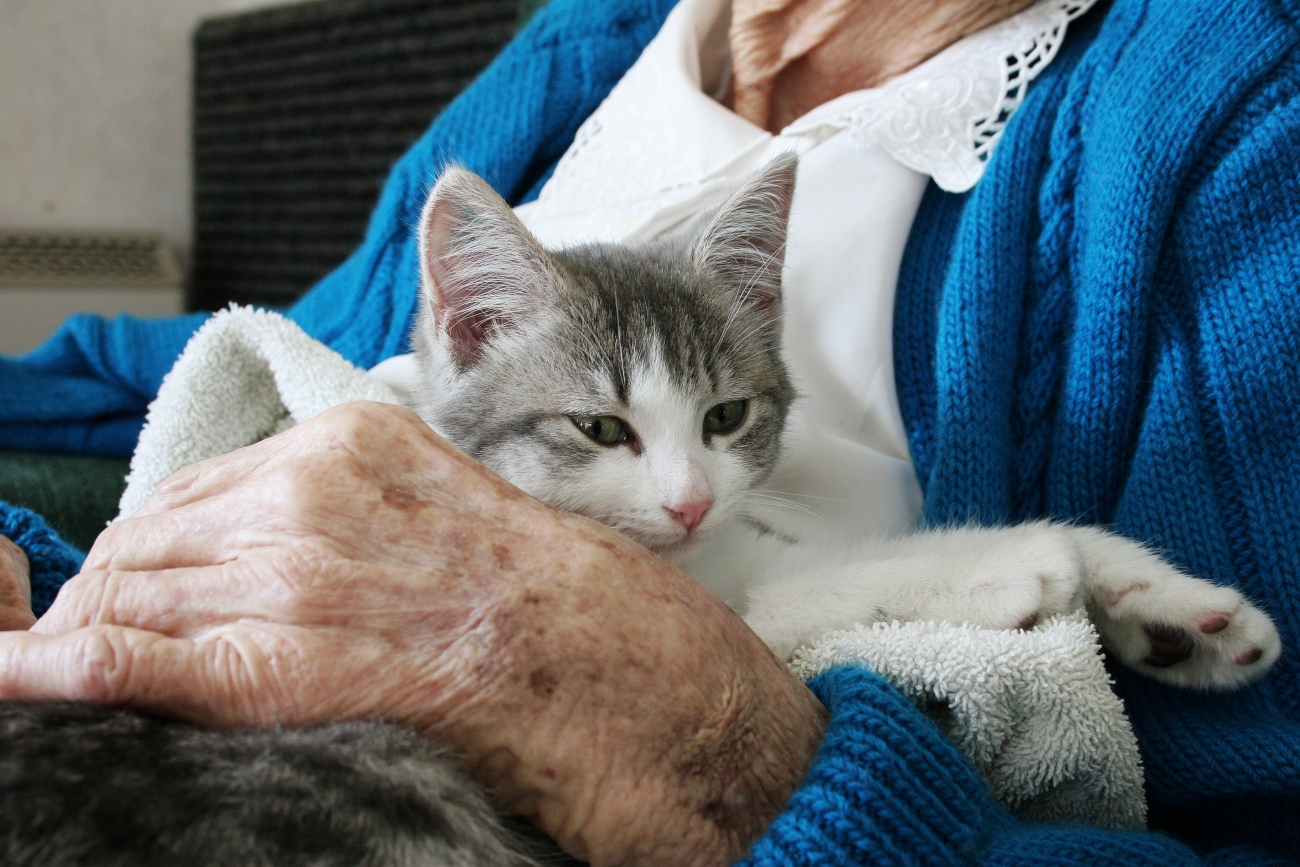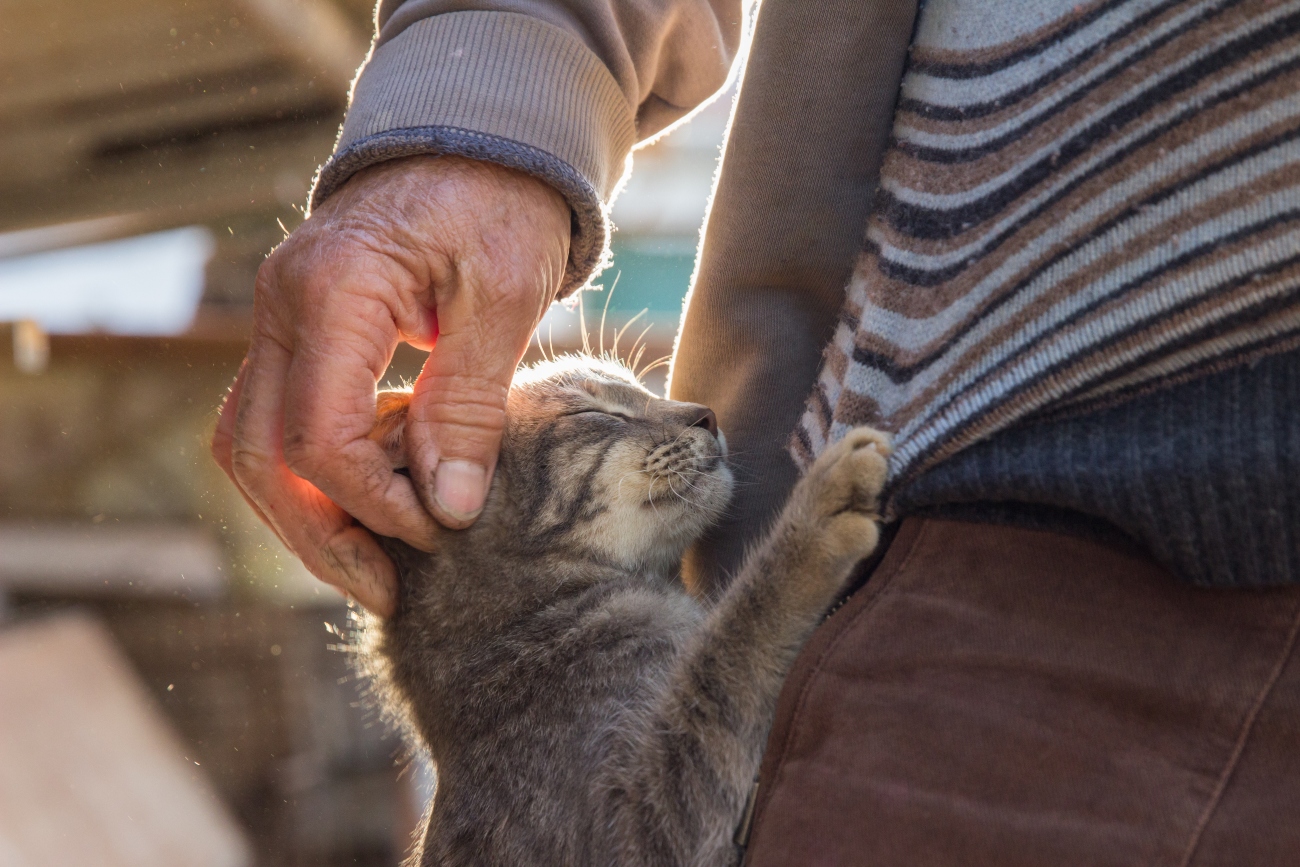
Is my senior cat lonely?
12th July, 2023
As seasoned cat owners, you've likely noticed that your feline companion's behaviour has changed over the years. The playful kitten that used to dart across your living room has now transformed into a more reserved and mature cat, preferring quiet moments to energetic playtime.
It's a natural progression of ageing, but it also raises questions like is my senior cat lonely?
This article will navigate the complexities of senior cat behaviour, helping you understand and respond to your older cat's needs.
Introduction to senior cat behaviour
Cats, unlike their canine counterparts, are often seen as solitary creatures. They have a reputation for being independent, even aloof at times.
However, this doesn't mean that they don't enjoy or need social interactions. As your cat ages, their behaviour might change in ways that make you question if they're feeling lonely. However, understanding what loneliness means to a cat is quite different from our human perception of it.
When it comes to senior cat behaviour, it's essential to remember that every cat is unique. Various factors influence their behaviour, such as their:
- Health
- Personality
- Past experiences
As pet parents, familiarising yourself with these factors can help you better understand what your cat might be feeling and how to best support them in their twilight years.
Understanding cat loneliness
Before you can answer the question: "Is my senior cat lonely?" you need to understand what loneliness means to a cat. Unlike humans, cats do not experience loneliness in the same way. Instead of craving constant companionship, they value a balance between interaction and solitude.
Loneliness in cats tends to be more about a lack of mental stimulation and engagement rather than a lack of company. A lonely cat is a bored and un-stimulated cat. They can feel lonely without another cat or human around, but they can also feel lonely even with many other cats, animals or people in the house if they are not getting enough interaction or stimulation.
Remember, even though your cat is ageing, they still require mental and physical stimulation to stay healthy and happy.
A change in behaviour or demeanour such as decreased activity, loss of appetite, or withdrawal could be signs of loneliness. However, it's important to note that these signs can also indicate other health issues, so it's always advised to consult with a vet if you notice significant changes in your cat's behaviour.
Common signs your senior cat might be lonely
Recognising the signs of loneliness in your senior cat is helpful.
Some common indicators include:
Excessive vocalisation
You may notice increased vocalization from cats experiencing loneliness to ask for more attention and quality time from their human companions.
Don't think this is the reason for your cat's meowing? Check out our article why is my cat meowing so much? for other potential factors.
Destructive behaviour
Cats that are lonely or bored may resort to destructive behaviour as a way of releasing their pent-up frustration or seeking stimulation. They may scratch furniture, chew on household items, or engage in excessive grooming from loneliness or boredom.
Changes in sleeping patterns
Cats are known for their long hours of sleep, but a lonely or bored cat may experience changes in their sleeping patterns. They may sleep less during the day and become more restless at night.
Reduced appetite
Loneliness and boredom can affect a cat's appetite. They may show disinterest in their food or eat less than usual.
Litter box issues
Loneliness or boredom can cause changes in a cat's litter box habits. They may start urinating or defecating outside the litter box as a way of seeking attention or expressing their discontent.
Factors influencing loneliness in older cats
Several factors can influence whether your older cat feels lonely. The loss of a companion, either human or animal, can lead to feelings of loneliness. Changes in the home environment, such as moving to a new home, can also unsettle your cat and cause feelings of loneliness or stress.
Your cat's health can also play a role. As cats age, they may experience health issues such as arthritis or sensory loss that can affect their ability to interact with their environment and lead to feelings of isolation or loneliness. Similarly, cognitive dysfunction or "cat dementia" can cause confusion and anxiety, which might manifest as loneliness.
Lastly, your cat's individual personality and life history will affect how they respond to ageing and potential loneliness. An outgoing and sociable cat might struggle more with feelings of loneliness compared to a more independent or introverted cat.
Do older cats get lonely? - Exploring the facts
So, do older cats get lonely? The answer is not straightforward. While cats value their independence, they also require social interaction and mental stimulation.
An older cat may feel lonely if these needs are not met. However, changes in behaviour that might suggest loneliness can also indicate underlying health issues.
Therefore, it's crucial not to jump to conclusions. If you're concerned that your senior cat might be lonely, it's essential to consider all potential factors and consult with a vet if necessary. Remember, your older cat's well-being depends on a balance of physical health, mental stimulation, and social interaction.
The difference between lonely and bored in cats
It's important to distinguish between a cat being lonely and a cat being bored. A bored cat might engage in destructive behaviour, overeat, or seem listless. While these are also signs of loneliness, they typically indicate a lack of mental stimulation rather than a lack of social interaction.
If your cat is bored, introducing new toys, puzzles, or interactive games can help. Regular playtime can also provide the necessary mental stimulation.
However, if your cat is lonely, they might require more interaction with you or even the introduction of a new feline friend or companion.
The effects of loneliness on senior cats
Loneliness can have a significant impact on your senior cat's overall health and well-being. It can lead to stress, which can exacerbate existing health issues or cause new ones. Loneliness can also lead to depression and anxiety in cats, impacting their quality of life.
Behavioural issues resulting from loneliness can also be problematic. From excessive meowing and clawing furniture to overeating and litter box issues, these behaviours can disrupt your household and help you tell if your cat is unhappy.
How to help a lonely senior cat - Tips and suggestions

Cats, like humans, thrive on companionship and mental stimulation. If lonely cats are left alone for extended periods or lack engaging activities, they can experience feelings of loneliness and boredom.
To alleviate loneliness and boredom in your cat, consider the following strategies:
- Interactive toys: Provide your cat with toys that encourage mental and physical stimulation, such as puzzle toys or interactive feeders.
- Playtime: Dedicate regular play sessions with your cat using toys that mimic hunting behaviour, such as wand toys or laser pointers.
- Vertical space: Create vertical spaces like cat trees or shelves to give your cat opportunities to climb, explore, and observe their surroundings.
- Feline companion: Consider getting another cat as a companion for your lonely cat, but ensure careful introductions and compatibility.
- Enriched environment: Create an enriched environment with scratching posts, hiding spots, and perches to stimulate your cat's natural instincts.
Remember, each cat is unique, so it's essential to observe their behaviour closely and adapt your approach to suit their individual needs.
Professional advice - When to consult a vet about your older cat's loneliness
If you're worried about your older cat's loneliness, it's advised to seek professional advice. A vet can rule out any underlying health issues that might be causing changes in behaviour. They can also provide advice on managing your cat's loneliness and improving their quality of life.
Remember, it's always better to be safe than sorry when it comes to your pets or cat's health. If you're unsure whether your cat is lonely or sick, don't hesitate to contact your vet.
Conclusion
Understanding whether your senior cat is lonely can be a complex process. Loneliness in cats is often more about a lack of mental stimulation rather than a lack of company, and it can manifest in various ways. If you're concerned about your cat's well-being, it's always best to consult with a professional.
Remember, as pet parents, your role is to provide a loving and stimulating environment for your pet, regardless of their age. With understanding, patience, and care, you can ensure that your senior cat lives their golden years in happiness and comfort.